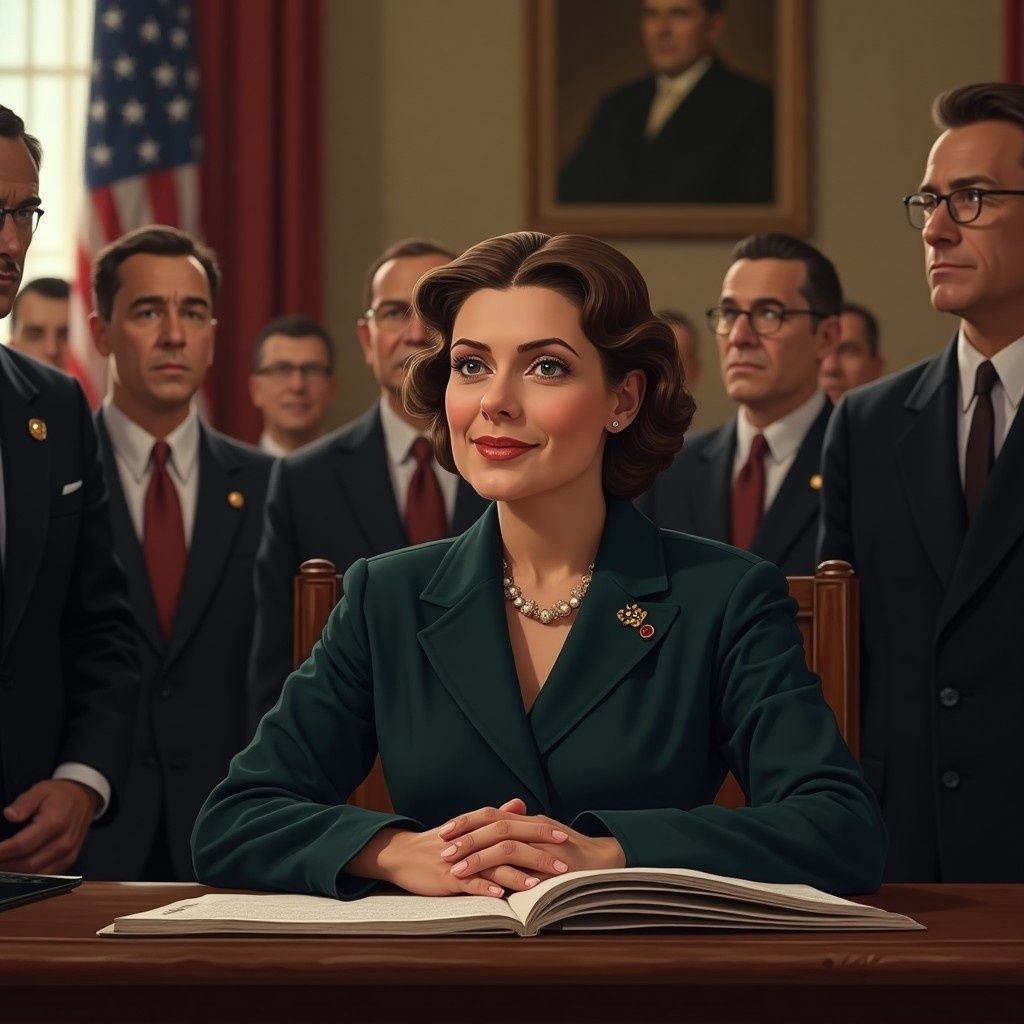Title: "A Quiet Revolution"
The Senate chamber was hushed, a silence broken only by the occasional rustle of papers or the soft clearing of a throat. Hattie Ophelia Wyatt Caraway sat at her desk, her hands folded neatly, her gaze steady and unwavering. The room was a sea of dark suits and somber faces, a world that had, until recently, been closed to women like her. But here she was, not as a token or a placeholder, but as a voice—strong, determined, and resolute.

Hattie had not sought the spotlight. When her husband, Thaddeus Caraway, passed away, she had been appointed to fill his Senate seat. It was meant to be temporary, a courtesy extended to a widow. But as she sat in that chamber, she felt a stirring within her, a call to action that could not be ignored. She had seen the struggles of the people of Arkansas, the farmers battling against the whims of nature, the veterans forgotten by the country they had served, and the families left destitute by the Great Depression. These were her people, and she would not let them down. Her decision to run for a full term in 1932 had been met with skepticism. The whispers had followed her through the halls of power, murmurs of doubt and condescension. "A woman can't handle the pressures of the Senate," they said. "She's too quiet, too meek." But Hattie knew that strength was not always loud, and determination was not always brash. Senator Huey Long, a man known for his own brand of audacity, had seen something in her that others had missed. He had offered his support, campaigning alongside her, drawing crowds with his fiery speeches. Yet, it was Hattie's quiet conviction that won the hearts of the people. She spoke not with grand gestures, but with sincerity, her words carrying the weight of her commitment.

In the years that followed, Hattie Caraway proved her mettle. She championed the causes that mattered to her constituents—agriculture, veterans' benefits, flood control. She stood firm in her support of the New Deal measures, understanding that change was necessary for progress. And when the time came, she co-sponsored the Equal Rights Amendment, knowing that her role was not just to represent, but to pave the way for others. Her colleagues had learned to respect her, not just as a woman, but as a senator. She had shown them that capability was not bound by gender, that a quiet voice could carry as much weight as a loud one. Her legacy was not just in the laws she helped pass, but in the doors she opened for those who would follow. As she sat in the chamber, Hattie glanced at the portrait of her late husband, hanging solemnly on the wall. She wondered what he would think of her journey, of the path she had carved out of necessity and conviction. She hoped he would be proud, not just of her, but of the future she had helped shape. Outside, the world was changing. Women were stepping into roles once deemed impossible, their voices rising in a chorus of determination and hope. Hattie Caraway had been a part of that change, a quiet revolution that had started with a single step into the Senate chamber.

Her story was not just one of politics, but of passion and perseverance. It was a testament to the power of belief, the strength of conviction, and the courage to defy expectations. And though her time in the Senate would one day come to an end, her legacy would endure, a beacon for those who dared to dream beyond the confines of tradition.

Hattie had not sought the spotlight. When her husband, Thaddeus Caraway, passed away, she had been appointed to fill his Senate seat. It was meant to be temporary, a courtesy extended to a widow. But as she sat in that chamber, she felt a stirring within her, a call to action that could not be ignored. She had seen the struggles of the people of Arkansas, the farmers battling against the whims of nature, the veterans forgotten by the country they had served, and the families left destitute by the Great Depression. These were her people, and she would not let them down. Her decision to run for a full term in 1932 had been met with skepticism. The whispers had followed her through the halls of power, murmurs of doubt and condescension. "A woman can't handle the pressures of the Senate," they said. "She's too quiet, too meek." But Hattie knew that strength was not always loud, and determination was not always brash. Senator Huey Long, a man known for his own brand of audacity, had seen something in her that others had missed. He had offered his support, campaigning alongside her, drawing crowds with his fiery speeches. Yet, it was Hattie's quiet conviction that won the hearts of the people. She spoke not with grand gestures, but with sincerity, her words carrying the weight of her commitment.

In the years that followed, Hattie Caraway proved her mettle. She championed the causes that mattered to her constituents—agriculture, veterans' benefits, flood control. She stood firm in her support of the New Deal measures, understanding that change was necessary for progress. And when the time came, she co-sponsored the Equal Rights Amendment, knowing that her role was not just to represent, but to pave the way for others. Her colleagues had learned to respect her, not just as a woman, but as a senator. She had shown them that capability was not bound by gender, that a quiet voice could carry as much weight as a loud one. Her legacy was not just in the laws she helped pass, but in the doors she opened for those who would follow. As she sat in the chamber, Hattie glanced at the portrait of her late husband, hanging solemnly on the wall. She wondered what he would think of her journey, of the path she had carved out of necessity and conviction. She hoped he would be proud, not just of her, but of the future she had helped shape. Outside, the world was changing. Women were stepping into roles once deemed impossible, their voices rising in a chorus of determination and hope. Hattie Caraway had been a part of that change, a quiet revolution that had started with a single step into the Senate chamber.

Her story was not just one of politics, but of passion and perseverance. It was a testament to the power of belief, the strength of conviction, and the courage to defy expectations. And though her time in the Senate would one day come to an end, her legacy would endure, a beacon for those who dared to dream beyond the confines of tradition.
Hattie Ophelia Wyatt Caraway made history as the first woman elected to serve a full term in the United States Senate, representing Arkansas from 1931 to 1945. Initially appointed to fill her late husband's seat, Caraway defied expectations by running for a full term in 1932, with significant support from Senator Huey Long. Known for her quiet demeanor, she focused on issues like agriculture, veterans' benefits, and flood control, supporting many New Deal measures. Caraway's tenure set a precedent for women in politics, showcasing their capabilities beyond traditional roles, and she became the first woman legislator to co-sponsor the Equal Rights Amendment. Her legacy is commemorated with a U.S. postage stamp and her gravesite's inclusion on the National Register of Historic Places.


Comments
Post a Comment